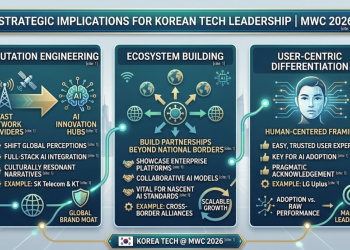The Korean communications service provider SK Telecom is partnering with Ericsson for 5G support Standalone networks by deploying cloud-native dual-mode 5G Core on its Cloud Native Infrastructure (CNIS). SK Telecom has worked with Ericsson for several years and the new contract is likely to strengthen their relationships, according to industry experts.
The next-gen cloud-native 5G Core network technology unveiled in 2019 was the first time the tech-duo had come together to plan and build such an architecture along with practical implementation. The new deal happens to level up the partnership with the latest 5G tech having standalone functionality.
Park Jong-kwan, VP and head of Infra Tech at SK Telecom, spoke to the media regarding the new partnership where he stated, “With this achievement, cloud-native and 5G will bring many new services, faster, to a broad range of industries. SK Telecom will continue to collaborate with industry leaders like Ericsson on cutting edge technologies that provide the best customer experience.”
The last couple of years have witnessed a rapidly growing demand for the 5G technology, which has led to increased requirement of cloud-native applications design and effective implementation of cloud infrastructure. Similarly, the communication service providers are expected to speed up the time taken to market the latest 5G subscriptions. Owing to such requirements, SK Telecom’s new partnership is considered a great step towards widening its market reach through cutting edge technologies.
Monica Zethzon, Head of Solution Area Packet Core, Ericsson, stated: “Korea is a leading 5G telecom market and together we achieved another great milestone with SK Telecom enabling 5G Standalone networks.. Standalone 5G will bring faster connectivity speeds, ultra-low latency and improved network reliability. Our powerful dual-mode 5G Core solution supports an ecosystem for innovation that facilitates customized 5G services for consumers and business users globally.”
Ericsson aims to attain smooth migration to 5G by combining EPC and 5G Core network functions into a common cloud-native platform. The company has trained its dual-mode 5G Core model to successfully shift ownership. With the Cloud Pack Core products, Ericsson has developed a powerful virtualized portfolio that deploys cloud-native platforms efficiently.
Through this partnership, SK Telecom will be able to offer better automation and improved performance in its 5G solutions. It will be scalable across all locations, including central and edge points. The removal of virtualization later from the cloud stack is expected to bring out all these changes while also supporting all types of 5G use cases. Industry experts call it an evolution of a powerful virtualized portfolio.
SK Telecom recently declared that the firm has added around 950K 5G subscribers in the last three months. With this, the Korean telecom giant presently has a total of 8.65 million nationwide subscribers.
In order to push 5G services in Korea, the Ministry of Science had recently declared that the govt will award 28 GHz and sub-6 GHz spectrum in the coming month. The frequencies will be provided to firms from various verticals and mobile operators in the country. The government is expected to allocate the 5G spectrum in the coming weeks.







